What are Comparisons? Structures of different types of Comparisons in English
Comparisons in English
The topic of comparisons is an important aspect of English grammar. What is a comparative sentence and how many types are there? What are the structures and usages? Let's explore this in detail in the following article and practice some related exercises!
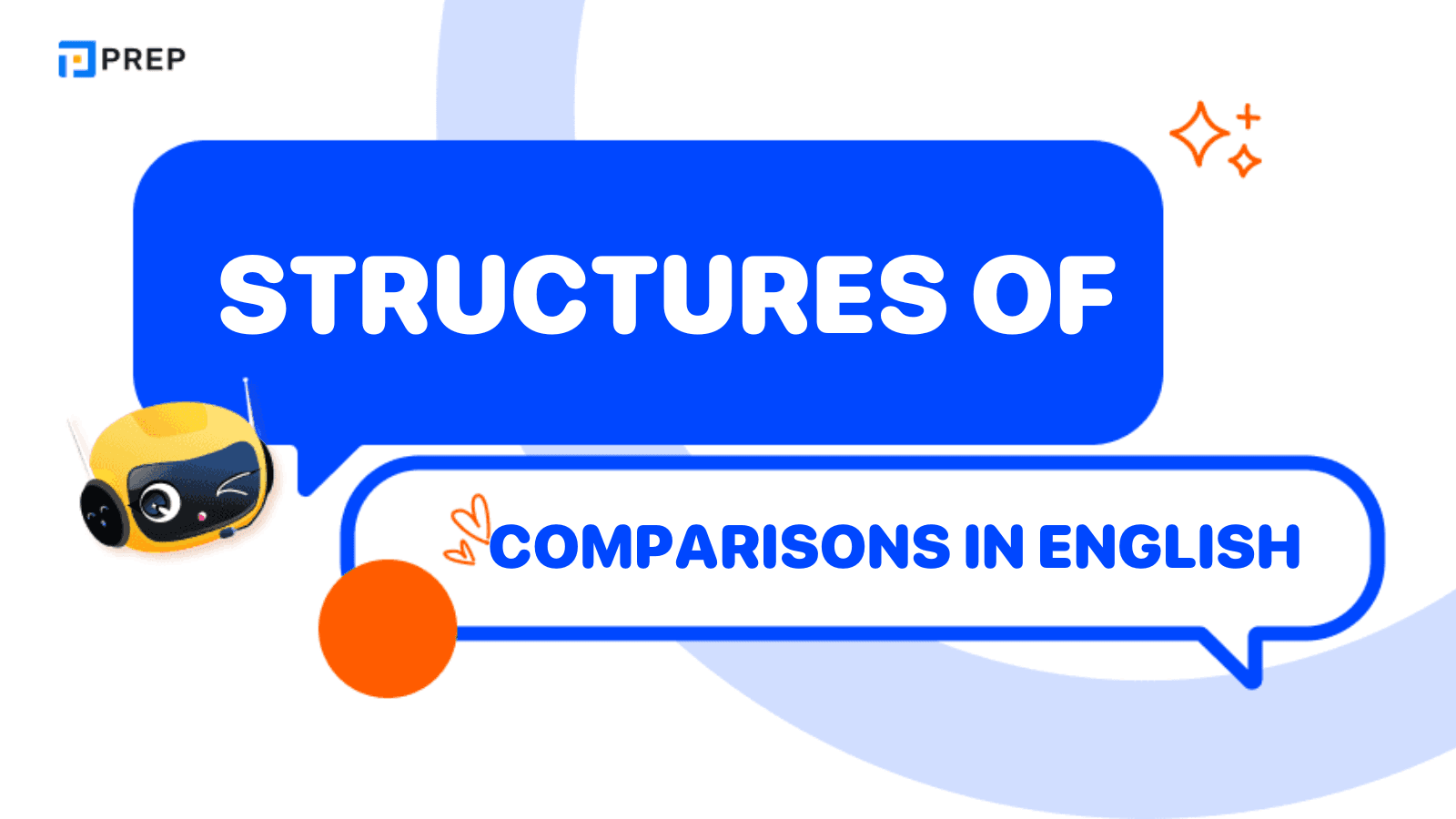
I. Definition and Usage of Comparisons in English?
What is a comparative sentence? A comparative sentence (Comparisons) is an English structure used to compare two or more people, objects, or situations in a specific aspect. For example, comparisons may involve height, weight, wealth, etc. The three main forms of comparative sentences in English are Equal Comparison, Comparative, and Superlative Comparison. Additionally, there are some special comparisons structures such as Multiplicative Comparison and Double Comparison. For example:
-
Equal Comparison: The wooden table is as high as the iron table.
-
Comparative: I type faster than my colleagues.
-
Superlative Comparison: I am the best at drawing in the class.
-
Multiplicative Comparison: She is three times smarter than her sister.
-
Double Comparison: The more you practice speaking English, the more confident you will become in your ability to communicate effectively.
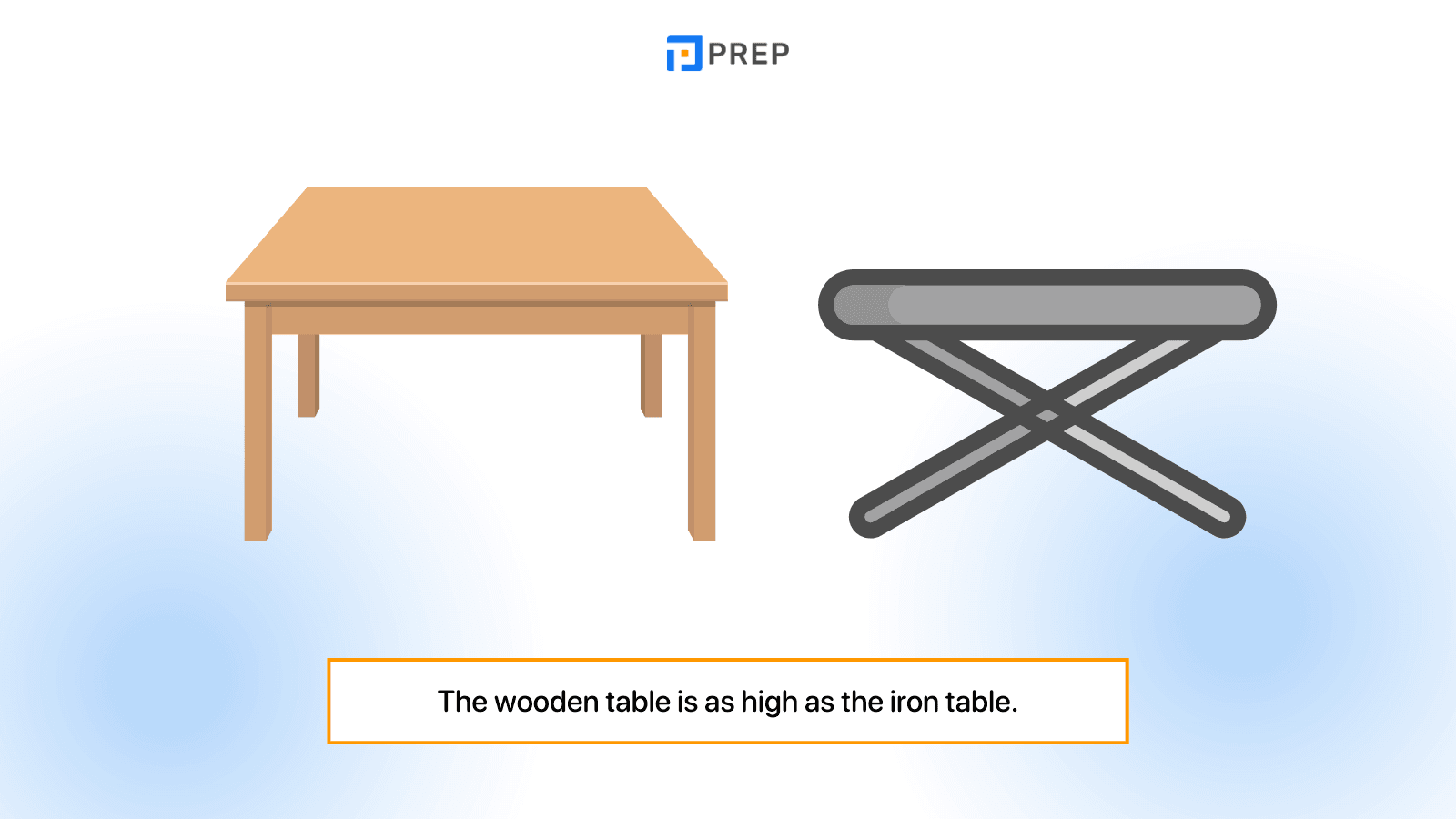
II. Types of Comparisons in English
In English, there are 3 main types of Comparisons and 2 special types. Let's explore the comparison grammar, structure and usage!
1. Comparisons of equality
What are Equal comparisons? Equal comparisons (Comparisons of Equality) are structures used to compare people or objects that are equal or comparable to each other.
Equal Comparisons with Adverbs/Adjectives:
S + V + as/so + (adj/ adv) + as + …
For example:
-
I play chess as well as Jessica.
-
My twin is as overweight as your brother.
Note: To form a non-equal comparison in English, you simply add "not" before "as/so..." in the above structure:
S + V + not + as/so + (adj/ adv) + as + …
For example:
-
This cake does not taste as good as the one I made last week.
-
This year's storm is not as strong as last year's storm.
Equal Comparisons with Nouns:
S + V + the same + (noun) + as + …
or
S + V + as + much/ many/ little/ few + Noun + as + …
For example:
-
Susan has the same interests as her brother.
-
They enjoy the same activities as their friends.
-
He has as few friends as his brother does.
-
They eat as many fruits as we do.
Note: To form a non-equal comparison in the two noun structures above, simply add "not" before the verb:
S + not + V + the same + (noun) + as + …
or
S + not + V + as + much/ many/ little/ few + Noun + as + …
For example:
-
He does not have the same job as his friend.
-
She does not drink as much coffee as her colleague.
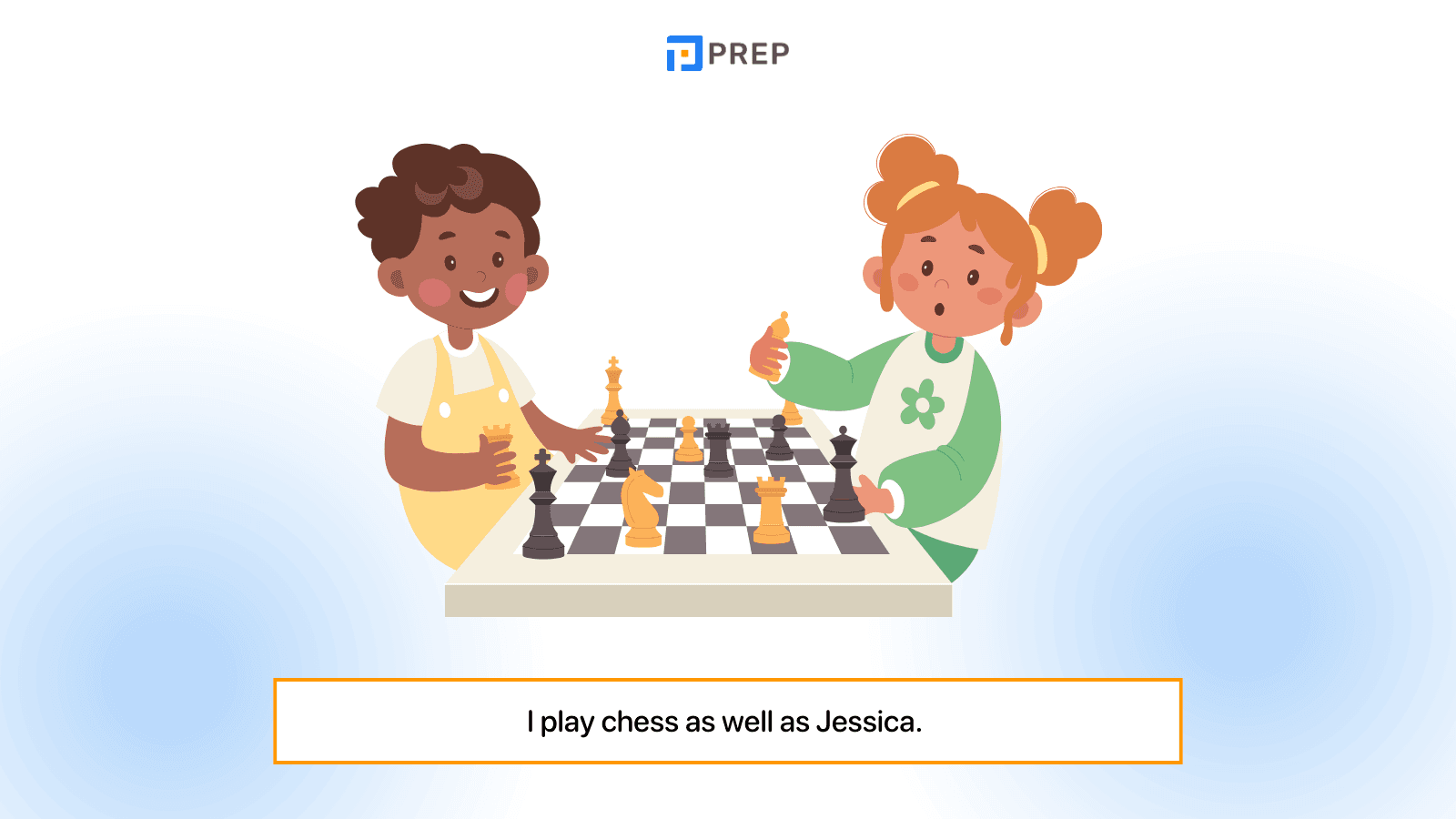
2. Comparative
Comparative is an English structure used to compare the differences in degree, size, quality, or other attributes between two subjects, characteristics, or actions.
S + V + Adj/Adv + -er + than
S + V + more + Adj/Adv + than
For example:
-
The weather in October is cooler than May.
-
Chinese food is spicier than Korean food.
-
I am more beautiful than I was 4 years ago.
-
My mother thinks more maturely than my father.
Additionally, you need to understand the formula for negative comparisons in English. The structure for negative comparison is:
S + V + not as/so + Adj/ Adv + as + than
or
S + V + less + Adj/ Adv + than
For example:
-
Humans don't run as fast as elephants.
-
Practicing yoga does not help people lose weight as quickly as exercising gym.
-
She is less intelligent than her twin brother.
-
Interns are less agile than managers.
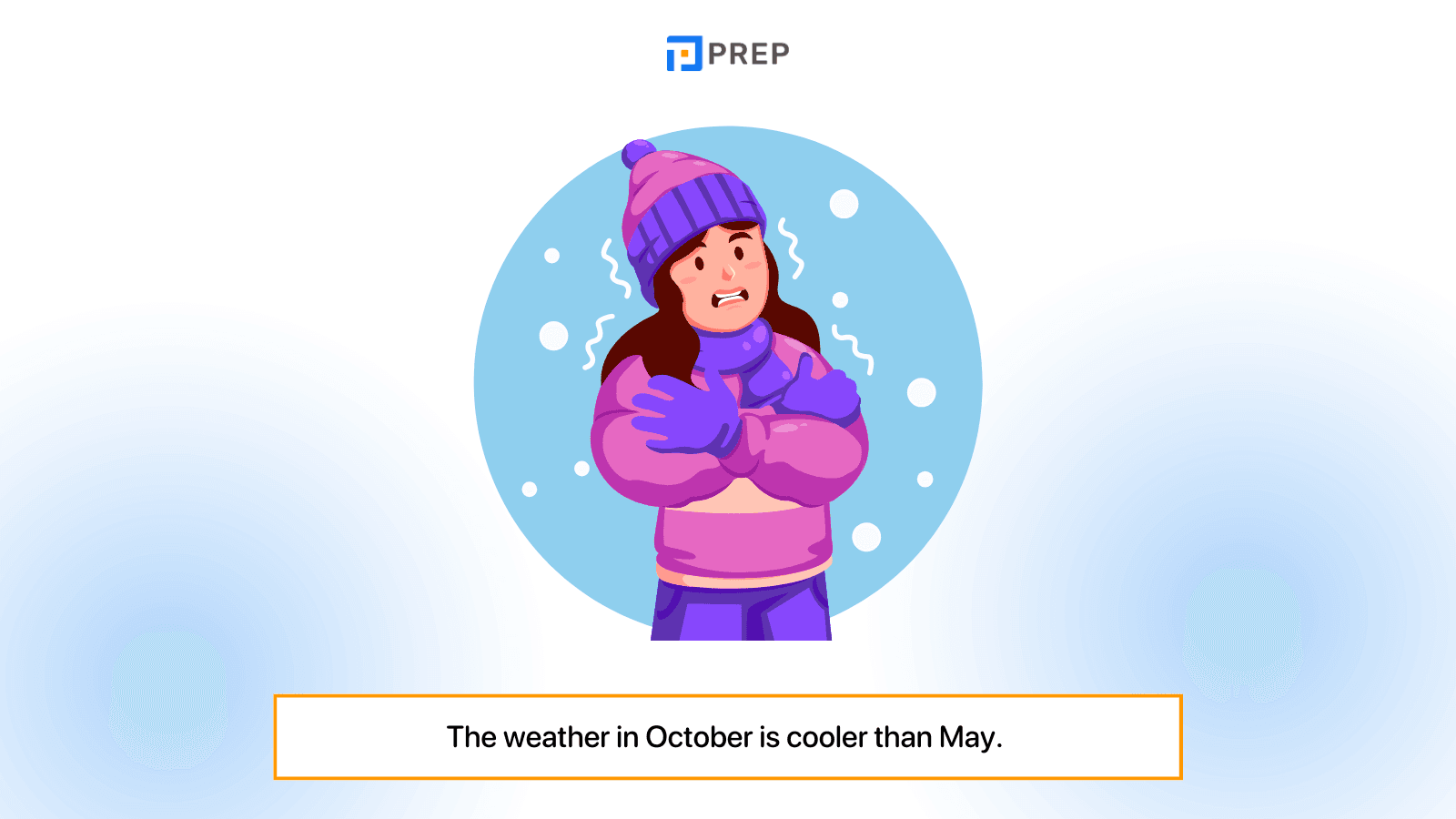
3. Superlative
Superlative in English is used to compare one subject, characteristic, or action with all other subjects. The superlative form indicates the maximum or minimum degree of a property.
S + V + the + Adj/adv + est + N
or
S + V + the + most Adj/adv + N
For example:
-
She is the tallest contestant in the Miss World.
-
Bitter melon is the bitterest fruit I have ever eaten.
-
My grandmother is the most industrious person in the family.
-
This performance was the most attractive in the competition.
Additionally, you need to understand the formula for the least comparison in English. The structure for the least comparison is:
S + V + the + least + Adj/Adv + O
For example:
-
She chose the least popular dish on the menu.
-
William has the least experience among all the candidates.
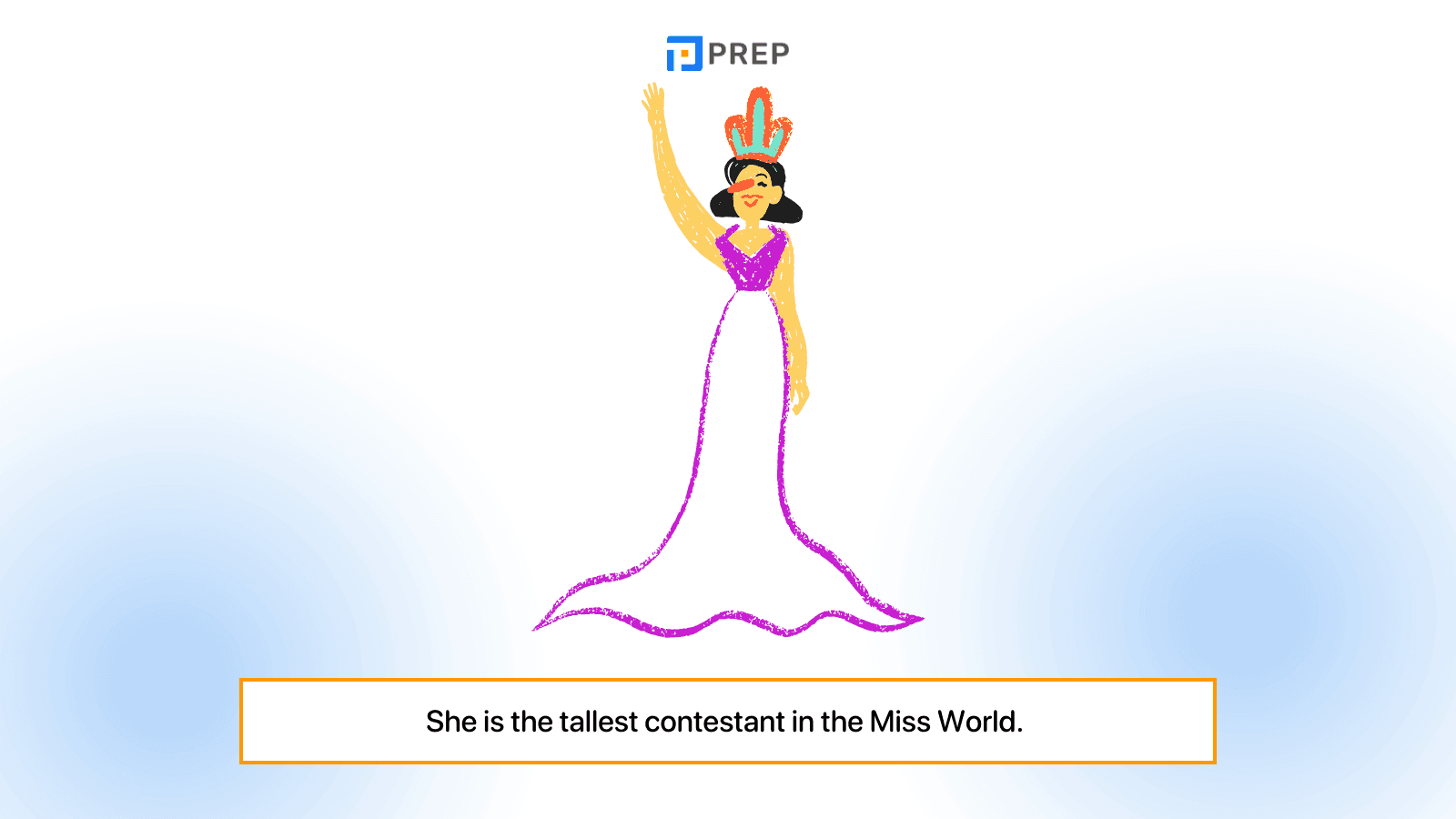
4. Multiplicative Comparisons
Multiplicative comparisons in English are used to describe the relationship between two quantities by stating how many times greater or smaller one quantity is compared to the other.
S + V + multiplicative + as + much/many/adj/adv + (N) + as + N/pronoun
For example:
-
She earns five times as much money as her friend does.
-
He studies twice as hard as his classmates.
-
He has twice as many comics as I do.
-
This car is three times as expensive as my old one.
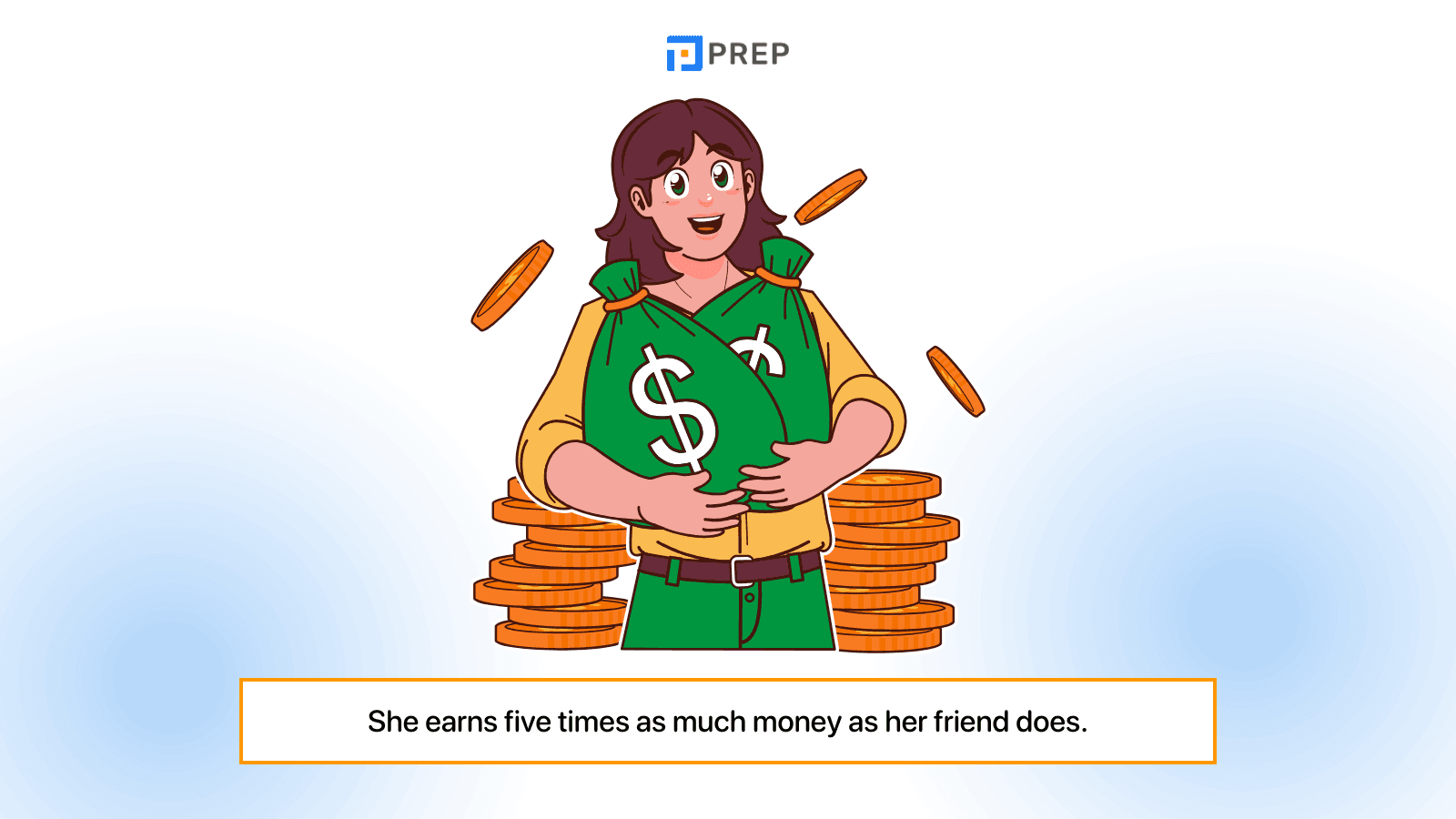
5. Double comparative
Double comparative sentences consist of two linked clauses showing that when a change occurs in one situation, it directly affects another. For example, 'The colder it becomes, the more I want to stay indoors,' clearly indicates how a change in temperature influences behavior. Similarly, 'The more you travel, the more you appreciate different cultures,' demonstrates how increased travel experience directly affects cultural understanding.
The + adj + er + S + V, the + adj + er + S + V/ The more + adj + S + V, the more + adj + S + V
or
S + V + adj-er and adj-er + O/ S + V + more and more + adj
or
The more/less + N + S + V, the more/less + N + S + V
Here are some Double comparative examples:
-
The colder it becomes, the more I want to stay indoors.
-
The more you travel, the more you appreciate different cultures.
-
The weather in this country is getting colder and colder as winter approaches.
-
The project is becoming more and more challenging as the deadline approaches.
-
The more you learn from work experience, the more opportunities you will have.
-
The less you argue, the more peaceful your life will be.
Based on the knowledge above, we can see that each type of comparative sentence accompanies short or long nouns, adverbs, or adjectives, and the structure of the sentence will have certain variations. Therefore, let’s explore more about short and long adjectives/adverbs in the following content!
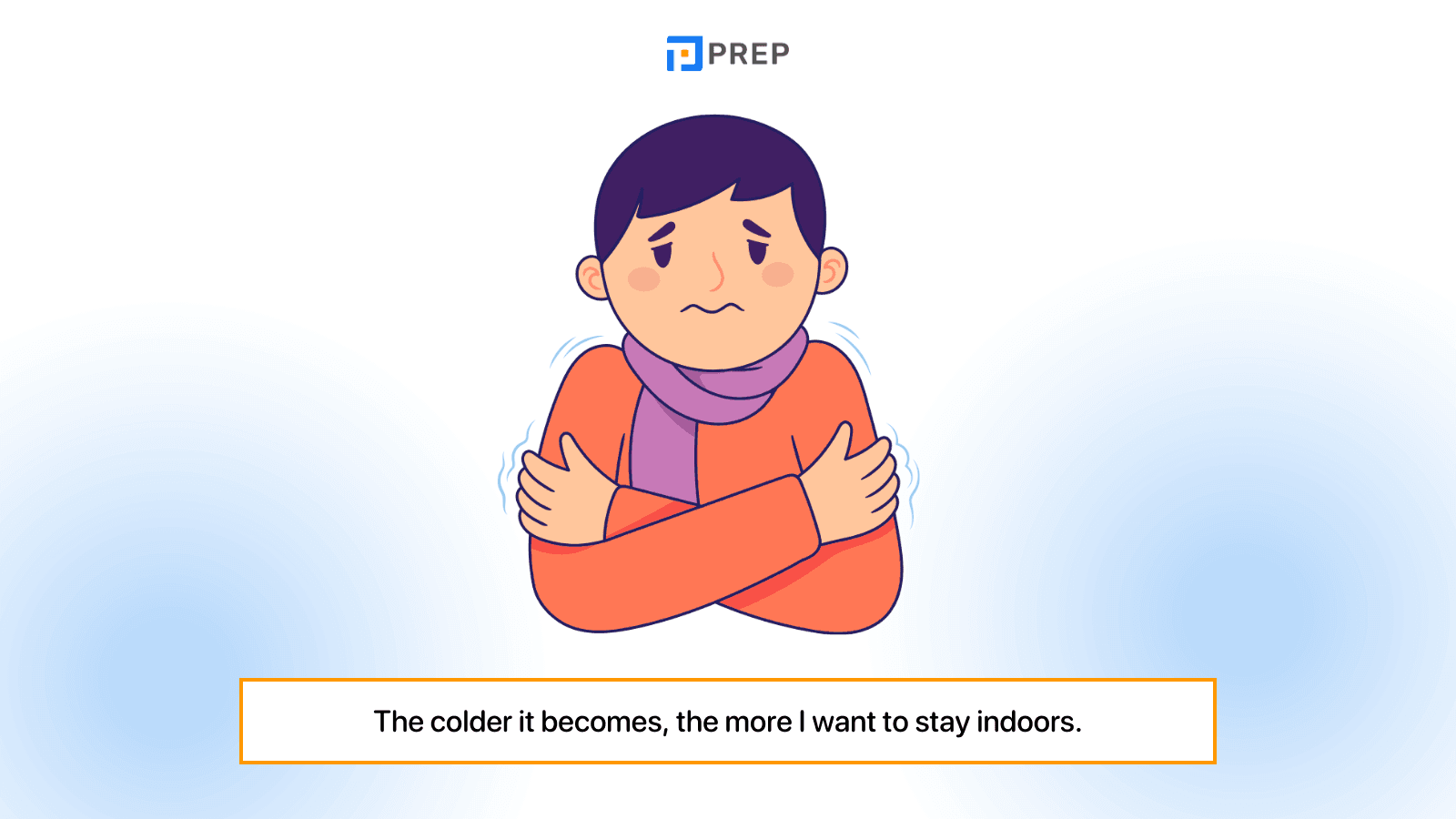
III. Comparison of adjectives (short and long adjectives/adverbs)
Short and long adjectives/adverbs in Comparisons will have different structures. Therefore, refer to the information below to correctly use this grammatical topic!
1. Short Adjectives/Adverbs
Short adjectives/adverbs in English consist of one syllable. For example:
|
Short comparative adjectives examples |
Short adverb |
|
|
Additionally, some English adjectives that have two syllables and end with the suffixes -le, -y, -ow, -er, or -et are also considered short adjectives.
-
Noble /ˈnoʊbl/
-
Happy /ˈhæpi/
-
Sunny /ˈsʌni/
-
Funny /ˈfʌni/
-
Narrow /ˈnæroʊ/
-
Quiet /ˈkwaɪət/
2. Long Adjectives/Adverbs
Long adjectives/adverbs are English words that have two syllables or more, except for those words classified as short adjectives.
|
Long comparative adjectives examples |
Long adverb |
|
|
3. Some Special Adjectives and Adverbs in Comparisons
|
Special Adjectives and Adverbs |
Comparison of adjectives examples |
|
Some English adjectives with two syllables that end in -er, -le, -ow, or -et are considered short adjectives (or one-syllable adjectives). |
|
|
Adverbs with two syllables that end in -y will change the -y to -i before adding -er or -est. |
|
|
Adverbs with two syllables that end in -ly retain the -ly and add "more" or "the most" in the comparative structure. |
|
|
For short adjectives in English, if they end with a consonant preceded by a vowel, you double the final consonant before adding -er or -est. |
|
4. Irregular Comparisons
|
Adjective/Adverb |
Comparative |
Superlative |
|
Good/ well |
better |
The best |
|
Bad/ badly |
worse |
The worst |
|
Many/ much |
more |
The most |
|
Little |
less |
The least |
|
Far |
Father/ Further |
The farthest/ The furthest |
IV. Notes When Using Comparisons in English
Below are some notes to keep in mind when using comparisons in English. Please refer to the table:
|
Note |
Example |
|
Confusion between Comparative and Superlative: Comparative adjective sentence is used to compare between two subjects, while superlative applies to three or more subjects. |
|
|
It is important to use the correct structure for comparatives or superlatives with short and long adjectives/adverbs. |
|
|
Missing the article "the" in superlative comparisons. |
|
|
Ambiguous or grammatically incorrect comparative sentences. |
|
|
Faulty comparison: To avoid faulty comparisons, ensure that both clauses are on the same subject. |
|
|
Missing "other" or "one" when comparing an individual to the rest of a group or collective. |
|
|
Confusion Between Fewer and Less:
|
|
V. Exercises on Comparisons with Detailed Answers
Let's practice some exercises below with PREP to master the use of Comparisons in English!
1. Exercise 1: Fill in the correct answers in the blanks
-
My sister thinks she's ______ (intelligent) than me, but I don't agree!
-
Avatar is probably ______ (bad) film I've seen!
-
What is ______ (wet) month of the year in England?
-
Do you think the White Fang films are ______ (good) than the books?
-
Who is ______ (powerful) person in this country?
-
I think Ted 1 was ______ (funny) than Ted 2.
-
Is Crystal ______ (old) than Jessica?
-
David is ______ (nice) person that I know.
-
They used to compare that Mariah Carey sang as ______ (beautiful) as Whitney Houston.
-
The more ______ (confident) he became, the more assertive his leadership style became.
2. Exercise 2: Match the appropriate clauses
|
Clause 1 |
Clause 2 |
|
1 - That actor is far more handsome in real life |
A - the colder it will be. |
|
2 - The harder you work, |
B - than I’d wanted to. |
|
3 - I spent more this week |
C - the cheaper the tickets will be. |
|
4 - The later you leave tonight, |
D - than on TV. |
|
5 - The sooner you book, |
E - than it looks. |
|
6 - This bingsu is less tasty |
F - the more we feed it! |
|
7 - Our rabbit is getting bigger and bigger |
G - the better you will do. |
|
8 - Erik did worse |
H - so we should arrive sooner than we expected. |
|
9 - The Swiss tennis player performed better |
I - than his opponent and won the tournament. |
|
10 - There isn’t much traffic today |
J - than I did in this month’s test. |
3. Exercise 3: Rearrange the sentences
-
that / keyboard / one / than / is / This / expensive / computer / more / slightly
-
train / will / than / much / a / taxi / longer / take / The / high-speed
-
do / far / than / My / scarier / I / finds / sister / spiders / younger
-
lot / gym / energetic / Yoga / is / than / less / a
-
little / planned / My / than / a / she’d / shopping / took / longer/ mother's
-
than / better / learns / Mathematics / her / friend / best / Anna
-
more / much / expensive / than / tablet / is / mine / Jack's
-
tower / highest / my / city / in / is / This / the
-
as / twice / high / this / week / are / last / prices / Vegetable
-
The / you / time / finish / sooner / your / have / books / read / more / to / housework
4. Answer keys
|
Exercise 1 |
Exercise 2 |
Exercise 3 |
|
|
|
This is a comprehensive summary of the knowledge on the grammar topic of Comparisons in English. Mastering these useful concepts will help you apply them in communication as well as in IELTS, TOEIC, and other exams!

Hi I'm Chloe, and I am currently serving as an Product Content Administrator at Prep Education. With over five years of experience in independent online IELTS study and exam preparation, I am confident in my ability to support learners in achieving their highest possible scores.
Comment
Premium content
View allPersonalized roadmap
Most read












